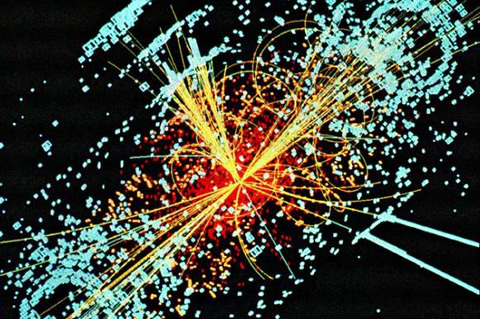|
|
|---|
|
American Politics Journal Atrios Barry Crimmins Betty Bowers Buzzflash Consortium News Daily Howler Daily Kos Democatic Underground Disinfotainment Today Evil GOP Bastards Faux News Channel Greg Palast The Hollywood Liberal Internet Weekly Jesus General Joe Conason Josh Marshall Liberal Oasis Make Them Accountable Mark Morford Mike Malloy Political Humor - About.com Political Wire Randi Rhodes Rude Pundit Smirking Chimp Take Back the Media Whitehouse.org More Links |
Subject: Higgs Boson explained

The Higgs is an elementary particle
that gives the property of mass to the subatomic particles
that make up everything. Based on your IQ of 64, I'll assume you don't
know anything about the Standard Model. ;)
Remember protons, neutrons and electrons from high school? They make up
atoms. Well, protons and neutrons
are made of even smaller "particles" such as quarks. The Higgs is so
fundamental that it generates mass for quarks
and electrons (and other, less famous particles).
Compare it to how the number of protons/neutrons and electrons in an
atom affects the properties of the element.
Smaller things give properties to larger things. Higgs would affect
everything in the whole damned universe.
The Higgs Boson was predicted back in 1964 and we've been looking ever
since. But only the most recently
constructed particle accelerators can generate enough power to "unlock"
the Higgs from inside of the other particles.
Now, of what use is it? Who knows? That's like asking Ben Franklin what
use electricity would be.
All he could tell you was that it existed, and that lighting was an
example of it.
And that it's not too bright of an idea to fly a kite in a thunderstorm.
Just like Franklin was too primitive to understand what could be done
with electricity,
we are too primitive - at present - to know what we could do with a
particle that alters mass.
There's an apocryphal tale (probably not true, but still relevant) that
compares to this situation. Decades after
Franklin flew his kite, in 1821, an amazing gentleman in England named
Michael Faraday invented the first
electrical motor (a homopolar motor). Mind you, he didn’t have anything
to do with his motor. It basically
sat there, creating just enough power to prove that getting work from
electricity is possible.
According to legend the Prime Minister came by and asked, "Of what use
is your invention?"
Faraday replied, "Who knows? But I wager you'll find a way to tax it."
The story is probably not true, but the idea is the same as this. In
1821 nobody could have imagined
the world we live in now. Nobody could have imagined that the work of
Faraday and others would
lead to the world we have today, with electronics EVERYWHERE,
influencing all aspects of life.
Nobody today can truly imagine what may be possible if we can harvest
the power of mass in the way
we have harnessed the power of electromagnetism. Maybe we can travel to
the stars (since the Lightspeed
speed limit is somewhat imposed by mass), this has been mentioned in
the press more than once. We could
be able to "un-mass" objects which would make transportation much
cheaper. We'll probably be able to learn
more about the origin of the cosmos thanks to the Higgs (high energy
particles like this tell us a lot about the
first moments of time). We may learn how to manipulate Dark Matter,
which is apparently affected only by
gravity. And gravity, of course, is caused by mass. So we might also
learn how to make artificial gravity
(a must for serious space exploration) or anti-gravity (which is just
plain fucking awesome).
The truth is that we don’t know what we will learn from the Higgs Boson
or be able to do with it.
Not yet anyway. But I'm sure it will blow our minds. Every bit as much
as cell phones and the Internet
would blow the minds of Franklin, Faraday, James Clerk Maxwell and
other early pioneers of electricity.
*phew* Sorry for the verbosity, Bart. Hope my blundering layman's
explanation didn't confuse you.
I'm no scientist, just a normal joe with a love for Reality. For those
of us who worship the Real World,
this is like finding the Holy Grail, True Cross and Ark of the Covenant
all rolled into one. It validates the
Standard Model of physics, and proves that we know quite a bit about
the nature and origin of the cosmos.
I'll drink to that any day.
Keep swinging,
Mitch

